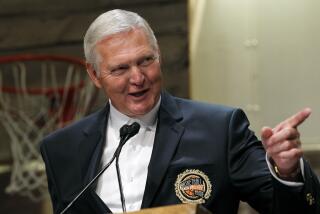After 40 Years, Lakers’ Jerry West Benches Himself
- Share via
The heavy lifting lasted for 40 years, from the game-winning jump shots that elevated the Lakers into the upper echelon of professional basketball to the savvy front-office decision-making that carried the franchise to four league championships in 18 years.
And now, Jerry West is tired.
West, the man responsible for the acquisition of such Laker stars as Shaquille O’Neal, Kobe Bryant, James Worthy and Byron Scott, announced Monday that he is stepping down as the club’s executive vice president, taking a break from the demands of the job after overseeing the Lakers’ recent return to the top of the National Basketball Assn.
The Lakers have officially termed it a “retirement,” but West is famous for his postseason bouts of should-I-stay-or-should-I-go indecision, by now an annual Laker rite of summer.
“I need to get off this merry-go-round for a while,” West, 62, said in an Internet interview Monday. “The average person wouldn’t understand the pressure and stress that I’ve felt in my life.”
Some in the Laker organization believe West is taking what amounts to a sabbatical, recharging his emotional and physical batteries for a year or two before returning as the head of the club’s operation. West will remain attached to the team in the informal role of an advisor.
Whatever his new role, it is certainly a step back for the man who since 1960 has defined professional basketball in Los Angeles. As a player, coach, executive and the silhouette in the NBA’s official logo, he was an icon for success.
The Lakers held a news conference to announce West’s resignation--and a successor, Mitch Kupchak, who becomes head of basketball operations while retaining his current title of general manager.
West did not attend the news conference, instead issuing a statement that said, in part, “This is a difficult yet happy time for me personally as I retire my position with the Los Angeles Lakers and enter another period of my life, one that will allow me more freedom to enjoy my friends and particularly my family, unburdened with the pressures of the professional athletic business.”
“Obviously, Jerry West is irreplaceable. What he’s meant to the Lakers’ franchise over the past 40 years is immeasurable,” Lakers owner Jerry Buss said.
West and the Lakers arrived in Los Angeles together in 1960--the team moving west after a dozen seasons in Minneapolis, West as a 22-year-old rookie drafted out of West Virginia University. West and forward Elgin Baylor were the city’s first basketball superstars, together leading the Lakers to five appearances in the NBA finals in the 1960s.
Five times, however, they lost in the finals to the dynastic Boston Celtics, and again in 1970 to the New York Knicks. Baylor retired before the quest could be completed, but in 1972, West, in his 12th professional season, finally broke through to help deliver Los Angeles’ first NBA championship--beating the Knicks in the finals to cap a 69-13 regular season in which the Lakers won a league-record 33 consecutive games.
West retired two seasons later, a 10-time NBA first-team all-star with a 27-points-per-game scoring average and the nickname “Mr. Clutch,” a reference to his ability to sink pressurized shots with the game on the line.
In 1976, West was named head coach of the Lakers. He posted a 145-101 record over three seasons but was unable to direct the team beyond the Western Conference semifinals. After serving as a special consultant to the team from 1979-82, West was appointed general manager by owner Jerry Buss in 1982, beginning one of the most impressive runs by a front-office executive in league history.
With West controlling the club’s day-to-day operations, the Lakers won four league championships and compiled a .673 winning percentage--best in the NBA--over an 18-season span. West inherited the talents of such superstars as Kareem Abdul-Jabbar and Magic Johnson when he became general manager before the 1982-83 season, but he assembled many of the key parts that triggered the Lakers’ “Showtime” success of the 1980s--drafting Worthy and A.C. Green, signing Bob McAdoo and trading for Scott and Mychal Thompson.
During that period, West predicted that his greatest challenge lay ahead in the 1990s, once the cornerstone veterans of the franchise retired. Abdul-Jabbar was gone by the time the Lakers lost to Michael Jordan’s Chicago Bulls in the 1991 finals, Johnson retired in November 1992, and Worthy quit after the 1993-94 season.
The Lakers did not return to the finals again during the 1990s, but in one week in 1996, West engineered two deals that would result in the 1999-2000 NBA championship. First, West traded center Vlade Divac to the Charlotte Hornets for the rights to an 18-year-old high school graduate named Kobe Bryant. Then, six days later, West signed free-agent Shaquille O’Neal to a $120-million contract.
Four years later, O’Neal and Bryant were young stars on a Laker team that defeated Indiana for this season’s NBA title, and has the potential for several more.
However, West, a legendary perfectionist, was unable to enjoy the Lakers’ success. Tormented by the demands and pressures required to maintain a consistent championship contender, West has contemplated resignation for several years. He went public with that desire during the 1997-98 season, then signed a four-year, $14-million contract extension through the 2003-04 season, then concluded every subsequent Laker season with the same open-ended question: Will West be back next year?
Finally, Monday, West took his first official step away from the Lakers. It might not be forever, but for now, the man who built, and rebuilt, the Lakers will now be working on upgrading his golf game.
More to Read
All things Lakers, all the time.
Get all the Lakers news you need in Dan Woike's weekly newsletter.
You may occasionally receive promotional content from the Los Angeles Times.






